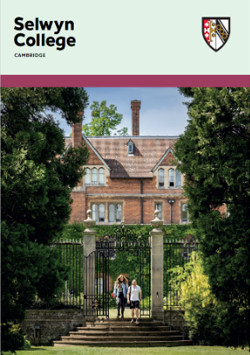Key facts
- Typical offer conditions - A*A*A - A*A*A* or IB 43 overall and 776 to 777;
- Required subjects - Chemistry and 1 other science/maths;
- Admissions tests - UCAT;
- Interviews - 2 subject and 1 general;
- Written work - none
- Average offers made - 8
Brief details of the course
Selwyn medical students spend three years studying pre-clinical courses before proceeding to the three year clinical part of the course. All students who are successful in the pre-clinical part will continue their studies in the Cambridge School of Clinical Medicine.
Medicine at Selwyn
Selwyn offers a unique pre-clinical experience; we take seriously the need to provide tomorrow’s doctors with a firm foundation in fundamental science upon which they can build their clinical careers. We also seek to provide a grounding in medical research, which we hope many of our students will undertake throughout their career. Our medical Fellows are active researchers and strongly supportive of our students participating in research, including applying to the integrated MBPhD programme at Cambridge. Our first year supervisions are conducted by Teaching Fellows who are also experienced clinicians in both medicine and surgery.
In 2022 we opened our new Medics and Vets resource centre, which provides both traditional and modern teaching aids - further enhancing Selwyn's offering to develop our medical students into the very best doctors. Selwyn is the only College in Cambridge to have the Anatomage table, one of the latest technological developments in virtual dissection, allowing enhanced anatomy exposure for our undergraduate medical students.
All lectures and practical work are organised by the University and take place on or near the Downing Site in the centre of Cambridge, where the Departments of Anatomy, Physiology, Biochemistry, Pathology, Pharmacology, and Experimental Psychology are situated.
The College arranges supervisions which take place in groups of 3-4 students for an hour a week in each subject. Written work is submitted to the supervisor and there is an opportunity to clarify topics from lectures. Supervisions are arranged by the Directors of Studies in Medicine, who also offer study support – including advice on what courses to take and how to approach them.
In the first year all University medical students take courses in human anatomy, physiology, biochemistry and medical genetics, together with ‘Preparing for Patients and Professional Practice’ – a course which lays the foundations for later clinical studies. In the second year the courses cover reproductive biology, neurobiology, pathology, pharmacology and psychology.
In their third year most medical students study a single subject in depth, for example Neuroscience or Pathology. Nearly all subjects include a research project or a literature review-based dissertation. Alternatively medical students can undertake a more general course by combining parts of two single subject courses, together with a Special Subject.
University examinations are taken at the end of each academic year. Parts IA and IB are taken at the end of the first and second years, respectively, and the 2nd MB is part of these examinations. We offer continued support and teaching throughout the clinical part of our student’s studies. All Cambridge undergraduate medical students progress to join the University of Cambridge School of Clinical Medicine for the final three years of their time at University, and Selwyn offers continued support and teaching throughout the clinical component of the degree.
The Teaching Fellows
The Director of Studies in Pre-Clinical Medicine is Dr Roddy O'Donnell (Consultant in Paediatric Intensive Care' Addenbrooke's Hospital), who supervises physiology. Prof. Grant Stewart (Professor of Surgical Oncology, and Consultant Urological Surgeon, Addenbrooke's Hospital). Prof. Charlotte Summers (Professor of Intensive Care Medicine, Consultant in Intensive Care Medicine, Addenbrooke's Hospital) and Dr Anna Balakrishnan (Consultant in Hepatobillary and Pancreatic Surgery, Addenbrooke's Hospital), are the Directors of Studies in Clinical Medicine.
Other College Fellows who take supervisions and provide mentorship to medical students are Prof. Stewart Sage (University Professor in Cell Physiology), and Prof. Robert Tasker (Professor of Paediatric Anaesthesia, Harvard Medical School).
Subject requirements
To apply for Medicine at Selwyn you will need A-Levels/IB Higher Levels (or the equivalent) as follows -
- Chemistry
- At least one other science or mathematics subject from: Mathematics; Biology, Physics' Further Mathematics
Interviews
Applicants will typically have three interviews. One interview is designed to find out about your interests and your motivation for the course, your practical experience with people, and your ability to cope with biological problems. The second subject interview will focus on your scientific understanding and your ability to reason. The general interview is with an Admissions Tutor. This is designed to learn about your activities outside your proposed field of study and the maturity of your approach towards academic work.
Admissions Assessment - UCAT
Candidates for Medicine will need to take the UCAT (University Clinical Aptitude Test). You must be registered in advance (separately to your UCAS application) to take the assessment. Please see the UCAT website for full and further details.
Other details
Medical students must turn 18 years old before 1 November in the year of admission.
March 2026


